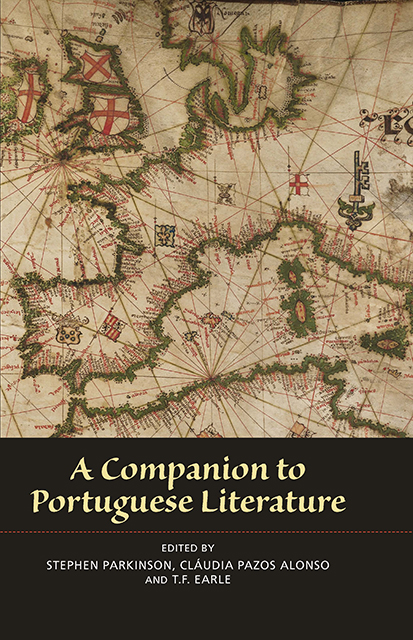Book contents
- Frontmatter
- Contents
- Acknowledgements
- Notes on the Contributors
- Introduction
- 1 Eight Centuries of Portuguese Literature: An Overview
- 2 The Medieval Galician-Portuguese Lyric
- 3 Fernão Lopes and Portuguese Prose Writing of the Middle Ages
- 4 Portuguese Theatre in the Sixteenth Century: Gil Vicente and António Ferreira
- 5 The Lusiads and the Literature of Portuguese Overseas Expansion
- 6 Lyric Poetry in the Sixteenth Century
- 7 The Seventeenth Century
- 8 The Eighteenth Century
- 9 Almeida Garrett: Founder of Modern Portuguese Literature
- 10 The Transition from Romanticism to Realism: Alexandre Herculano, Camilo Castelo Branco and Júlio Dinis
- 11 Eça de Queirós: A European Writer
- 12 Fernando Pessoa and the Modernist Generation
- 13 Narrative and Drama during the Dictatorship
- 14 Women Writers up to 1974
- 15 Writing after the Dictatorship
- 16 Portuguese Literature in English Translation
- Index
10 - The Transition from Romanticism to Realism: Alexandre Herculano, Camilo Castelo Branco and Júlio Dinis
Published online by Cambridge University Press: 03 March 2023
- Frontmatter
- Contents
- Acknowledgements
- Notes on the Contributors
- Introduction
- 1 Eight Centuries of Portuguese Literature: An Overview
- 2 The Medieval Galician-Portuguese Lyric
- 3 Fernão Lopes and Portuguese Prose Writing of the Middle Ages
- 4 Portuguese Theatre in the Sixteenth Century: Gil Vicente and António Ferreira
- 5 The Lusiads and the Literature of Portuguese Overseas Expansion
- 6 Lyric Poetry in the Sixteenth Century
- 7 The Seventeenth Century
- 8 The Eighteenth Century
- 9 Almeida Garrett: Founder of Modern Portuguese Literature
- 10 The Transition from Romanticism to Realism: Alexandre Herculano, Camilo Castelo Branco and Júlio Dinis
- 11 Eça de Queirós: A European Writer
- 12 Fernando Pessoa and the Modernist Generation
- 13 Narrative and Drama during the Dictatorship
- 14 Women Writers up to 1974
- 15 Writing after the Dictatorship
- 16 Portuguese Literature in English Translation
- Index
Summary
Although the rise of extensive prose fiction in Portugal lies long before the nineteenth century (with precedents such as Bernardim Ribeiro's Menina e Moça and Fernão Mendes Pinto's Peregrinação), it is in the nineteenth century that the novel becomes an established literary genre in Portugal, largely (as elsewhere in Europe) due not only to the growth of a leisured and literate middle class with the time and the disposable income to hand for this pursuit, but also to the increasing capacity of publishers to cater to a mass market. At the same time, however, it is this very fluid social and economic context (allied to other historical circumstances, such as the loss of Brazil and the ideological and dynastic disputes of the early decades of the century) which stimulated the urgency of a creative reflection on the state of the nation and the individual within it. These factors may be seen running through the work of the four most notable writers of prose fiction before Eça de Queirós: Almeida Garrett, Alexandre Herculano, Camilo Castelo Branco, and Júlio Dinis.
The historical fiction of Alexandre Herculano (1810–77) has often been compared to that of Sir Walter Scott. Herculano himself referred to ‘the immortal Scott’ in the notes to his Eurico o Presbítero (1844; translated as Euric the Priest), and while this and his other major works of fiction – O Monge de Cister (1843; The Cistercian Monk), O Bobo (1848; The Jester) and Lendas e Narrativas (1851; Tales and Legends) – easily lend themselves to such a comparison through their evocation of the nation in its period of formation and the stimulation of an environment of past heroism, they are also marked by an intense preoccupation with historical accuracy and detail, as well as by forceful (if occasionally extreme) psychological portraits of the major characters depicted. This sense of realism even within the context of a Romantic re-creation of an elusive past led to controversy in other contexts, as, for example, in Herculano's open letter to the Patriarch of Lisbon Eu e o Clero (1850; My Relations with the Clergy), where he questioned the legitimacy of one of the foundational narratives of the nation, the veracity of the legend regarding Christ's anointing of Afonso Henriques as King of Portugal before the battle of Ourique in 1139.
- Type
- Chapter
- Information
- A Companion to Portuguese Literature , pp. 120 - 130Publisher: Boydell & BrewerPrint publication year: 2009

